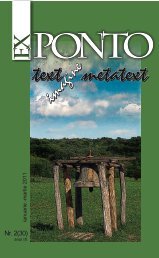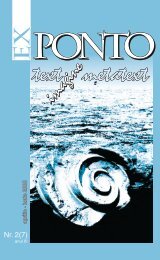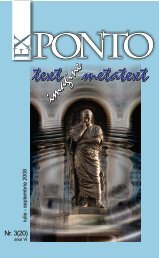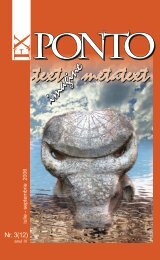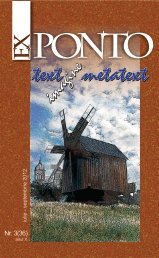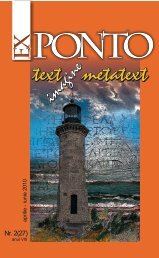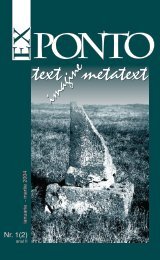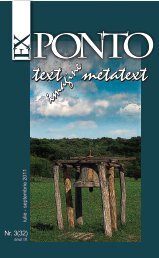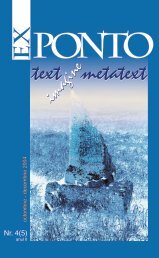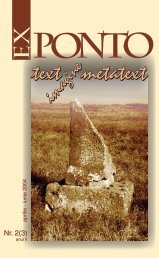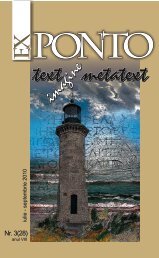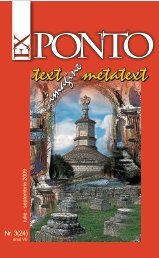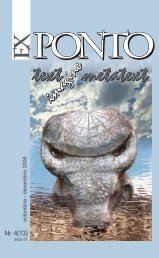Nr. 2 (19) anul VI / aprilie-iunie 2008 - ROMDIDAC
Nr. 2 (19) anul VI / aprilie-iunie 2008 - ROMDIDAC
Nr. 2 (19) anul VI / aprilie-iunie 2008 - ROMDIDAC
Create successful ePaper yourself
Turn your PDF publications into a flip-book with our unique Google optimized e-Paper software.
also have employed Romanian poets among whom for instance our classic<br />
Dosoftei’s versified psalms and heraldic poetry proved to fit wonderfully certain<br />
progressive rock themes and rhythms.<br />
So as we can see from the examples above rock poetry in all its three<br />
acceptations accommodates naturally elements from cultural areas and<br />
times considerably remote from rock culture. This is a feature that modern<br />
poetries in general share, both modernist and postmodernist, avant-garde or<br />
rearguard, experimental or formal, confessional or language. Just as we have<br />
an impressive overwhelming corpus of rock poetry and modern literary poetry<br />
as well that at least apparently draws upon no erudite, over-knowledgeable,<br />
or in any other way remote references.<br />
So the good news is that rock poetry has access to all treasures as well as<br />
asceticisms of modern literary poetry whatsoever. And certain parts of it thus<br />
definitely qualify (which is in the stakes of this thesis) as significant modern<br />
poetry. What we should worry about is maybe how we could ever differentiate<br />
between rock and non-rock poetries. Could any (good) poem be read as a<br />
rock poem, just as we have with Bishop’s “Sonnet” and just as Elledge has<br />
included poems in his anthology that hardly mentioned anything linked to<br />
rock culture or poems whose authors acknowledged no actual implication of<br />
rock and roll “at all” in their writing those poems, and just as Sarah Hamilton<br />
draws intriguing parallels between a major outstanding band in the history –<br />
Led Zeppelin – and a poet whose poetry has never been read before as rock<br />
poetry – John Ashbery?<br />
I think a first criterion would be the involvement of or the potential linking<br />
to popular culture. Ashbery’s poetry is a poetry profusely imbued with popular<br />
culture. Bishop’s need for assertion of lesbian identity and the fashion of<br />
doing it is very relevant and expressive for the high/low culture border<br />
blurring in modern pop and media culture. The Shakespearean songs that I<br />
have mentioned could be read from a wider perspective according to which<br />
Shakespeare’s plays were actually the real popular culture of his time (cf. for<br />
instance Docker 168-2<strong>19</strong>). Going beyond the distinction between high and low,<br />
as for instance in the maximalist manner of Frank Zappa, helps such poetry<br />
absorb ‘classical stuff’ and integrate it into popular culture.<br />
But then, while popular culture could be a necessary criterion it is not<br />
always a sufficient one. As we have seen above one of the poets in Elledge’s<br />
anthology, Floyd Skloots claimed that rock and roll was part of his life (the<br />
true topic of his poetry) in the same way “the Dodgers, early television, and<br />
being a Polio Pioneer in <strong>19</strong>54 were part of my life” (Elledge 260). As the poet<br />
implicitly argues rock culture does not exhaust the whole popular, media, and<br />
educational culture phenomena in America. When an explicit mention of rock<br />
(including names of significant figures and/or products – in all senses – of rock<br />
culture) is not present – hence unlike jazz poetry where explicit references are<br />
prevailing, with outstanding exceptions like Crane and for instance, sometimes<br />
Clark Coolidge – we have to identify other criteria that could qualify a poem<br />
as a rock one.<br />
When I first mentioned above the ‘songs’ in Shakespeare’s Midsummer<br />
Night Dream as possible rock lyrics the first reason I had in mind was not the<br />
stature of the poet and playwright as a star in the popular culture unreleased<br />
charts of the Renaissance. But just as I mentioned I firstly remarked certain<br />
prosodic and euphonic qualities and a certain diction that recommended<br />
those lines as possible rock poetry – in the sense of rock lyrics. The popular<br />
Ex Ponto nr.2, <strong>2008</strong><br />
127




